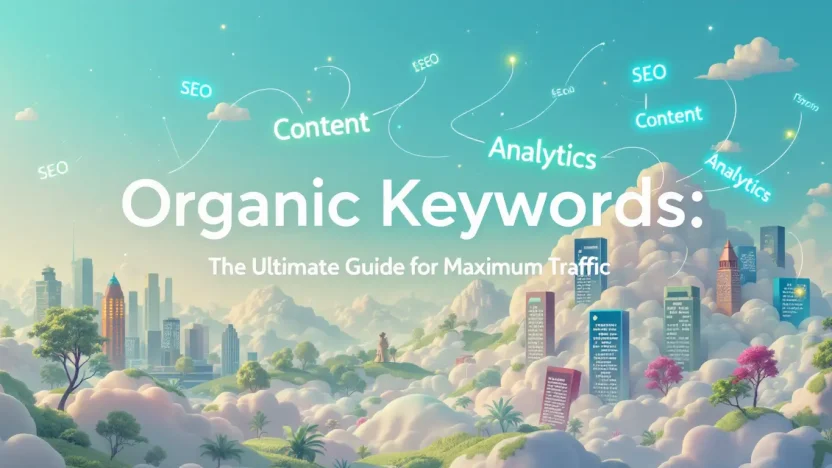In the vast digital landscape, organic keywords are akin to the hidden gems of a treasure map. These natural, non-paid keywords are the key to unlocking unparalleled search engine visibility, driving a steady stream of eager, relevant traffic to your website.
For developers, marketers, and tech enthusiasts, mastering the art of organic keywords is a strategic game-changer. This ultimate guide unravels the secrets behind choosing and optimizing organic keywords, ensuring you stand out in the crowded online marketplace. We’ll explore everything from foundational concepts to advanced strategies, giving your content the visibility it deserves.
Ready to dive deep into the world of organic keywords and boost your site’s traffic? Let’s embark on this journey! Continue scrolling for the Table of Contents and prepare to transform your SEO strategy.
Table of Contents
- What Are Organic Keywords?
- Why Organic Keywords Matter for Your SEO Strategy
- How to Identify High-Performing Organic Keywords
- Tools for Finding Organic Keywords
- Advanced Techniques for Optimizing Organic Keywords
- Case Studies: Success Stories with Organic Keywords
- FAQs
- Conclusion
What Are Organic Keywords?
Organic keywords are the lifeblood of any successful SEO strategy. But what exactly are they? In the simplest terms, organic keywords are search terms that users enter into search engines, resulting in unpaid, natural search results. Unlike paid ads, organic keywords require a more nuanced approach, focusing on relevance and natural incorporation into content. To master these keywords, understanding their nature is crucial. Learn more here.
Why Are Organic Keywords Important?
Organic keywords play a pivotal role in driving organic search results to your website, enhancing its visibility and authority. The beauty lies in attracting visitors who are genuinely interested in what you offer, increasing engagement and conversion rates. This tailored attraction makes them an indispensable element of any website’s SEO strategy.
- Boosts Search Rankings: Proper use of organic keywords elevates your search engine results page (SERP) ranking, making your site more accessible.
- Improves Click-Through Rates (CTR): Organic results often gain higher trust and attract more clicks than paid counterparts.
How to Identify Organic Keywords
To identify effective organic keywords, consider using analytics tools. Platforms like SEMrush offer insights into the search terms bringing traffic to your site. Analyzing these data helps tailor content to match user intent, leading to a more targeted audience and, ultimately, higher traffic. For a deeper dive, check out our comprehensive guide on SEO and Content Marketing on ITScope.io.
Why Organic Keywords Matter for Your SEO Strategy
Ever wondered why some websites soar to the top of search results while others languish unnoticed? The secret often lies in effectively using organic keywords. These are the terms your audience naturally uses to search for content relevant to your niche. They can drastically improve your visibility in search engine results, driving substantial organic search traffic to your site.
Integrating organic keywords into your SEO strategy is like planting seeds for future success. Over time, the benefits compound, resulting in higher search rankings and increased traffic. According to TechTarget, organic search results often evoke more trust from users, because they haven’t been influenced by paid advertising.
- Increased Visibility: Organic keywords are crucial for appearing in search results, ensuring that potential customers find your content.
- Cost-Effective Traffic: Unlike paid ads, organic search keyword strategies offer a free avenue to capture more clicks and engagement.
- Enhanced User Trust: Users trust organic results more than paid ones, as they perceive them as less biased.
When crafting content, focusing on organic keywords allows you to create targeted, relevant, and valuable content. Check out our complete guide on SEO and Content Marketing for further insights into mastering this art.
Integrating organic keywords forms the backbone of a successful SEO strategy, impacting traffic and engagement positively.
For detailed strategies on optimizing organic keywords, visit Keyword Hero’s guide.
How to Identify High-Performing Organic Keywords
In the vibrant realm of digital marketing, recognizing high-performing organic keywords is like finding treasure—it’s key to driving massive traffic to your site. But how can you spot these gems? Let’s dive in and explore practical steps for uncovering the best organic keywords.
Start with an Audit
Your first step is to audit your existing content. Understanding which organic search keyword currently draws traffic is essential. This process lays the groundwork for finding patterns and opportunities.
Leverage Powerful Keyword Tools
Tools like Keyword Hero are indispensable in your quest to find valuable keywords. Such tools provide insights into search volume, competition, and more—turning the keyword hunt into an actionable strategy.
Analyze Competitors
Peek into your competitors’ strategies. By understanding the organic keywords they’re ranking for, you can identify gaps in your approach. Use resources like TechTarget’s guide to organic search results for deeper insight.
- Look for Patterns: What organic search keyword themes do your competitors use? Identify recurring subjects and leverage this knowledge.
- Spot Unused Opportunities: Gaps in competitor strategy can become your strengths.
Engage with Your Audience
Talk to your users to identify what organic keywords resonate with them. Customer feedback can reveal surprising trends that may not be apparent through data alone.
Key benefit of identifying high-performing organic keywords: Maximizing your SEO and reaching the right audience effectively.
For more detailed strategies, check out our comprehensive guide on SEO and Content Marketing.
Tools for Finding Organic Keywords
Navigating the vast digital landscape to pinpoint organic keywords can seem daunting, but the right tools make all the difference. Let’s dive into some sage devices that can supercharge your organic search keyword strategy.
- SEMrush: An industry favorite, SEMrush provides insightful data, from traffic estimates to keyword difficulty. It’s ideal for identifying organic keywords that drive traffic.
- Ahrefs: Known for its robust backlink analytics, Ahrefs also excels at uncovering the potential of organic keywords. It offers a detailed analysis that guides your content strategy.
- Google Keyword Planner: A classic, and for good reason. Google Keyword Planner helps you grasp search volumes and trends, supporting your SEO and content marketing efforts.
Benefits of Using Tools
Tools streamline the discovery process, allowing you to focus on crafting impactful content. They offer insights into your competition and open doors to opportunities previously hidden from view.
Key benefit of using organic keyword tools: Enhanced visibility and traffic potential for your site.
| Tool | Key Feature |
|---|---|
| SEMrush | Traffic estimates & keyword difficulty |
| Ahrefs | Backlink and keyword insights |
| Google Keyword Planner | Search volume trends |
As you delve deeper into these tools, remember that successful keyword strategies integrate seamlessly with content marketing efforts. Continue exploring how these elements work together here.
Advanced Techniques for Optimizing Organic Keywords
Are you ready to unlock the full potential of your organic keywords? Let’s dive into some advanced strategies that can significantly enhance your traffic and improve your search engine rankings. Understanding organic search results is crucial for mastering these techniques.
1. Keyword Intent Analysis
Understanding user intent is paramount. Are people searching for your organic keywords to find information, or are they looking to buy? By aligning content with user intent, you boost its relevance, which improves your organic search keyword ranking.
- Informational Intent: Craft informative content that provides solutions or answers.
- Transactional Intent: Optimize product pages to convert searches into sales.
2. Content Gap Analysis
By conducting a content gap analysis, you can identify what competitors rank for that you don’t. Tools like Semrush and Ahrefs can help detect missed opportunities and discover valuable content themes to target with organic keywords. Fill these gaps with comprehensive, high-value content to capture more traffic.
3. Optimize for Long-Tail Keywords
Long-tail keywords, although less searched, often bring in highly targeted traffic. Incorporate variations of your main organic keywords to capture niche searches. This detailed optimization can significantly grow your audience base and enhance your SEO strategy.
Incorporating long-tail variations can capture niche audiences efficiently.
4. Internal Linking Strategy
Strategic internal linking helps distribute link equity throughout your site. Link related content and deeper pages to create a cohesive network. Start by linking from high-traffic pages to those you want to boost, enhancing the effectiveness of your SEO and Content Marketing efforts.
| Technique | Benefit |
|---|---|
| Keyword Intent Analysis | Improves content relevance |
| Content Gap Analysis | Gains competitive edge |
| Long-Tail Keyword Optimization | Captures niche audience |
| Internal Linking | Distributes link equity |
Apply these advanced techniques thoughtfully, and witness a remarkable transformation in your SEO performance.
Case Studies: Success Stories with Organic Keywords
Have you ever wondered how some websites naturally rise to the top of search engine results? The secret often lies in effective use of organic keywords. Let’s dive into real-world success stories highlighting how businesses have skyrocketed their online presence by expertly leveraging organic keywords.
The Success of a Digital Marketing Firm
A well-established digital marketing firm wanted to boost their online visibility. By focusing on a strategic list of organic search keywords, they optimized their content extensively. This targeted approach resulted in a 50% increase in organic traffic within just three months.
- Strategy Implementation: The firm identified relevant organic keywords using specialized analysis tools.
- Results Achieved: Improved rankings on search engine results pages (SERPs) that drove significant traffic.
Ecommerce Website Boost
An ecommerce startup harnessed the power of organic keywords by scrutinizing their organic search keyword strategy. The focus was on understanding customer intent and adapting their product descriptions accordingly, which led to a 30% uplift in sales over six months.
| Company | Organic Traffic Growth | Strategy Duration |
|---|---|---|
| Digital Marketing Firm | 50% | 3 Months |
| Ecommerce Startup | 30% | 6 Months |
Intrigued by the potential of organic keywords? For a deeper understanding of how to implement these strategies, visit our guide on SEO and Content Marketing: The Ultimate Guide to Mastering Digital Success.
These case studies demonstrate the transformative power of organic keywords when utilized effectively in digital strategies.
FAQs
What are organic keywords?
Organic keywords are search terms used by people to find content organically within search engines like Google. These keywords are crucial because they drive traffic without the need for paid advertisements. Learn more about their impact on SEO in our SEO and Content Marketing Guide.
Why are organic keywords important?
Organic keywords are essential because they align with user search intent, improving your site’s visibility naturally. This results in sustainable traffic growth which can boost website rankings and authority over time. Dive deeper into the power of organic keywords on SEMrush.
How can I find organic keywords?
There are numerous tools for discovering organic keywords, such as Google Search Console and third-party keyword research tools like Keyword Hero. These tools reveal which terms are leading users to your site organically. Explore more methods on Keyword Hero.
What is the difference between organic and paid keywords?
Organic keywords naturally appear in search engine results without payment, while paid keywords require an advertising budget to gain visibility. Understanding this distinction helps tailor your marketing strategy for better long-term success. Explore more about organic search results on TechTarget.
How to optimize content for organic keywords?
To optimize your content, ensure you naturally integrate organic keywords throughout your articles, titles, and meta descriptions without keyword stuffing. Provide value-driven content that answers user questions effectively. For more strategies, check out our SEO and Content Marketing Guide.
Conclusion
Mastering organic keywords is an indispensable skill for maximizing your website’s traffic. By strategically incorporating them into your content, you lay the groundwork for sustained growth through organic search keyword optimization. This practice not only improves your ranking but also attracts quality leads who are genuinely interested in your offerings.
Understanding the nuances of organic keywords and how they function within the ever-evolving algorithm of search engines is crucial. Regularly analyze and adapt your strategy to maintain a competitive edge. Dig deeper with tools like Keyword Hero to optimize your content further.
Reflect back on our comprehensive journey in this guide, and remember, like any skill, consistency and adaptation are key. Explore more strategies in our SEO and Content Marketing guide to ensure your digital success. By employing best practices, you’ll tap into the powerful potential of organic search and drive your business towards unparalleled success.



